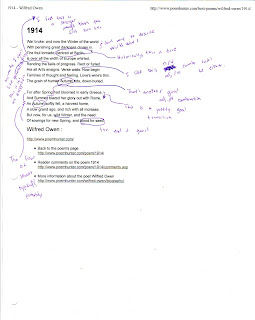Original poem reprinted online here: "1914" by Wilfred Owen
Originally read: December 16, 2012
More information about the Poet: Wilfred Owen
So this poem is a timepiece which depicts the feeling/mood/era of World War I. War poems are tricky things. There's always the outsider looking in perspective -- the ones who judge the war, and there's always the insider trying to make sense of it all for the outside. I'll admit, that I don't have a sense for war even though America has, technically, been at war for over ten years at this point. It's really kind of odd when I think about it.
Anyway, this is not a politics blog (oh those will come eventually, or actually I have done those in the past). And the strongest feature in the poem are the phrases in the poem. I note several in my written notes: "sails of progress", "verse wails", "human Autumn rots", "blood for seed". It's not like these words create strong realistic images -- but there's a surreal aspect with the descriptions.
And even though those phrases aren't tied down to "real images" they work for me in two ways.
1) As a person who never has been to war and only understands such things through movies, articles, etc. I feel the phrases agree with my thoughts about war.
however
2) Looking at the phrases -- they might come as euphemisms for real life actions -- a rotting body, the artist torn asunder. It's the only way that I, or the speaker, can comprehend war. But we are distanced from the "real" thing.
I guess I come away with this question after rereading this poem. Is the surreal easier to relate to since, theoretically, no one can experience a surreal image, or is it just, for me, difficult to conceive and/or emote with concrete images if I haven't directly experienced them before. I'm not too sure anymore. As always.
Originally read: December 16, 2012
More information about the Poet: Wilfred Owen
So this poem is a timepiece which depicts the feeling/mood/era of World War I. War poems are tricky things. There's always the outsider looking in perspective -- the ones who judge the war, and there's always the insider trying to make sense of it all for the outside. I'll admit, that I don't have a sense for war even though America has, technically, been at war for over ten years at this point. It's really kind of odd when I think about it.
Anyway, this is not a politics blog (oh those will come eventually, or actually I have done those in the past). And the strongest feature in the poem are the phrases in the poem. I note several in my written notes: "sails of progress", "verse wails", "human Autumn rots", "blood for seed". It's not like these words create strong realistic images -- but there's a surreal aspect with the descriptions.
And even though those phrases aren't tied down to "real images" they work for me in two ways.
1) As a person who never has been to war and only understands such things through movies, articles, etc. I feel the phrases agree with my thoughts about war.
however
2) Looking at the phrases -- they might come as euphemisms for real life actions -- a rotting body, the artist torn asunder. It's the only way that I, or the speaker, can comprehend war. But we are distanced from the "real" thing.
I guess I come away with this question after rereading this poem. Is the surreal easier to relate to since, theoretically, no one can experience a surreal image, or is it just, for me, difficult to conceive and/or emote with concrete images if I haven't directly experienced them before. I'm not too sure anymore. As always.

Comments
Post a Comment